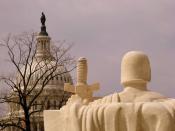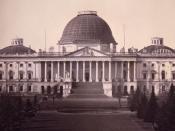In a Representative Government there must be representation. In the case of the U.S., that representation comes from the United States Congress. Congress was created through the Constitution as an intrinsic part of the government. The Constitution establishes a delineation of powers; Congress has three very important powers, the legitimacy to use those powers, and the consequences if those powers are abused.
Congress has significant power, but it cannot do a number of things. It cannot: establish a national school system, pass laws requiring people to vote; or set minimum ages for drivers and marriage licenses. The three most important powers of Congress are the following: taxation, control trade, and declaration of war. Although Congress has far-reaching powers to tax, this ability is not unlimited. For example Congress is not allowed to have church taxes, poll taxes, export taxes, or private taxes, to name a few. It is imperative to understand that congress is limited in everything it can do by the Constitution.
All the limitations for taxation that were listed above, and more, are specifically enumerated throughout Article I of the Constitution. Without the power to impose taxes, the government would not be able to pay off its debts as well as the fact that the Nation would be crippled because of a lack of services that exist. Congress is also given the "commerce power." That means that Congress has the ability to regulate and control interstate and foreign trade. This power is key to the Constitutions as well. Without it the nation would be crippled. The third most important power delineated to Congress is the power to declare war. Congress is the only body in the United States that can declare war on another nation. This enumeration includes the right to raise and support the armies. If Congress...


